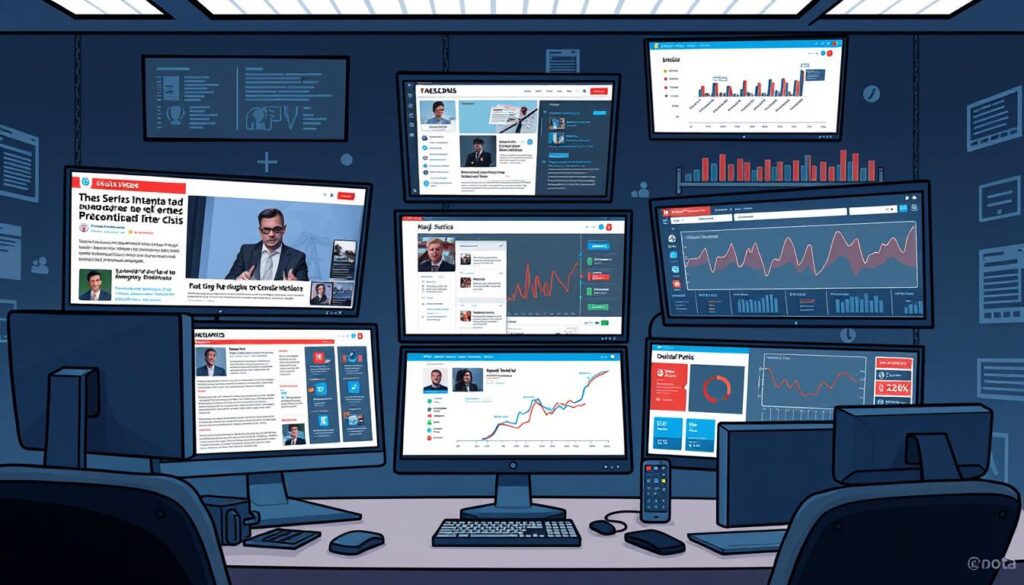Keeping your online image in check is key. Reputation Return offers a quick, affordable way to fix your online image problems. Managing a reputation crisis means having a plan ready to handle unexpected issues that could harm your company’s image or relationships.
This strategy is all about being prepared to act fast and well when a crisis hits. How well a company handles a crisis, how quickly it recovers, and how it affects long-term trust are key signs of success in reputation crisis management.
Key Takeaways
- Reputation crisis management is essential for protecting a company’s brand and public image.
- Effective crisis response requires a well-designed plan, a dedicated team, and transparent communication.
- Monitoring and analyzing online mentions can help identify potential crises early on.
- Implementing proactive strategies and maintaining a positive online presence can mitigate the impact of a reputation crisis.
- Working with a professional reputation management company can streamline the crisis response process and help rebuild trust.
What is Reputation Crisis Management?
Reputation crisis management is about getting ready for and handling big issues that can harm a company’s image and trust. It’s a key part of public relations (PR). The goal is to lessen the bad effects of a crisis and fix the brand’s image through clear communication and quick action.
Defining Reputation Crisis Management
PR experts use many strategies to handle a brand’s crisis response. This includes watching for threats, making plans, setting up crisis teams, and sending out messages that are open, quick, and caring.
The Importance of Effective Crisis Management
In today’s fast world, where news spreads fast and opinions change quickly, managing a crisis well is key to keeping a brand’s good name. Studies show that up to 80% of people trust a brand more when it solves problems, leading to more loyalty. Also, about 85% of people trust online reviews as much as friends’ advice, showing how important it is to keep a good online image during tough times. Good crisis management can reduce bad feelings, keep trust, and even help a business grow, as 81% of people are more likely to buy from a brand again after a good experience.
Ask for a free consultation to discuss your crisis >>>
“Effective crisis management helps in defining crises and designating decision-makers, reducing confusion during emergencies.”
Whether it’s a big social media issue, a product recall, or a data breach, being quick and clear in handling a crisis can save a brand’s reputation. By planning ahead and using proven crisis management plans, companies can keep their brand strong and set themselves up for success in the long run.

Identifying and Monitoring Potential Crises
In today’s fast-paced digital world, keeping an eye on your company’s online presence is vital. Crisis management is more important than ever. Media monitoring and social listening tools are great for spotting early signs of trouble.
Media Monitoring and Social Listening
Watching online mentions of your brand is key. Media monitoring tools help you see if people are talking about you positively or negatively. This way, you can catch problems early and avoid big PR issues.
Tracking Mention Volume and Sentiment
A sudden increase in negative mentions is a warning sign. Keeping an eye on these numbers lets you act fast. On the other hand, more positive mentions mean your brand is doing well.
Setting Up Alerts and Notifications
Having a good alert system is crucial. It can send notifications to your team about brand mentions. This way, you can tackle problems before they get worse and keep your brand’s story on track.
Ask for a free consultation to discuss your crisis >>>
| Metric | Impact |
|---|---|
| Crisis Preparation Rate | Organizations with a well-prepared crisis management plan are 60% less likely to suffer severe reputation damage in the event of a crisis. |
| Communication Response Time | Organizations that respond within the first hour of a crisis are 45% more successful in managing public perception effectively. |
| Stakeholder Engagement | Companies that actively engage stakeholders in crisis planning are 70% more likely to recover swiftly from a crisis event. |
| Media Relations | Proper media handling during a crisis can enhance reputation recovery by up to 40% within the first six months post-crisis. |
Using media monitoring, social listening, and alerts helps you stay ahead of crises. Remember, early detection and swift action are key to navigating a crisis successfully.

“Catching these early warning signs allows your team to look into issues before they grow and maintain control of your brand’s story.”
reputation crisis management: Preparing a Response Plan
Having a good response plan is key in reputation crisis management. You need a dedicated team and solid communication strategies. These help tackle threats to your reputation.
Assembling a Crisis Management Team
Start by picking a crisis management team. They will plan and act to lessen the crisis’s impact. Make sure they have the support and resources they need.
This team should have people from PR, legal, operations, and customer service. Their diverse skills help tackle the crisis from all sides. Also, work with business continuity planners to make sure plans work together smoothly.
Developing Crisis Communication Strategies
It’s also important to create strong crisis communication plans. Prepare different ways to address the issue, like press releases or social media posts. This way, you can quickly respond to a crisis and control the message.
Your response should be reassuring, transparent, and respectful. Show that you’re looking into the issue and care about your clients. This helps keep trust and gives you time for a detailed response. Keep checking and updating your strategies to stay ready for crises.
Creating a comprehensive crisis management plan is vital. With a dedicated team and smart communication, you can handle reputation threats. This protects the trust your stakeholders have in you.
Executing Crisis Management Strategies
When a crisis hits, your rapid response is key. It shows how your organization handles tough situations. A quick, clear response can give you time to plan a more detailed message.
Later, you can use press releases or other content to talk to stakeholders. This helps keep everyone informed and involved.
Being open and respectful is vital in a crisis. It helps rebuild trust and keeps relationships strong. This way, you can get through the tough times and keep your reputation strong.
Monitoring and Adjusting Tactics
Learning from past crises is crucial in managing PR crises effectively. Always check how well your crisis management tactics are working. Be ready to adapt your strategies based on how people react.
Tools like Prowly help you monitor the effectiveness of your crisis management. By learning from past crises, you can get better at handling future ones.
“The way an organization handles a crisis has a notable impact on its reputation. The success of crisis management can lead to a positive perception by the public and stakeholders, while mistakes or mishandling can result in negative perceptions.”
Conclusion
Managing a PR crisis well is key to keeping your brand safe. By watching for problems early, having a good team ready, and talking clearly and quickly, you can lessen the harm. Reputation Return is a quick, affordable way to fix your online image and protect your brand.
This article shows why planning for crises is so important. With 88% of leaders seeing reputation risk as a big worry and over 65% thinking social media can make things worse, a good plan is vital. Remember, it takes 20 years to build a good name, but just five minutes to damage it. So, be ready to handle a crisis well.
Your team is very important in a crisis. Training them to protect your brand is a big step. Also, making changes, having a crisis plan, and using SEO can help keep your reputation strong. By focusing on these areas, you can face a crisis with confidence and come out even stronger.

